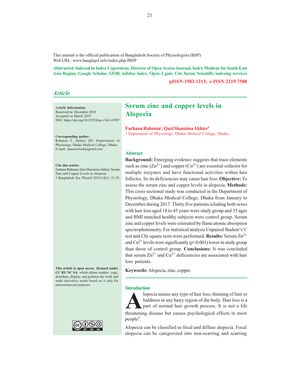TLDR People with hair loss often have lower levels of zinc and copper in their blood.
The study conducted at Dhaka Medical College involving 35 patients with alopecia and 35 healthy controls found that those with alopecia had significantly lower serum zinc and copper levels, as measured by flame atomic absorption spectrophotometry (p<0.001). This suggests that deficiencies in these trace elements may be associated with hair loss, and monitoring their levels could aid in managing alopecia. These findings align with prior research on the role of zinc and copper in hair follicle function and growth.
 37 citations
,
March 2014 in “Journal of Trace Elements in Medicine and Biology”
37 citations
,
March 2014 in “Journal of Trace Elements in Medicine and Biology” Lower hair zinc and copper levels found in Turkish males with hair loss; higher BMI linked to less hair zinc.
 June 2024 in “Research Square (Research Square)”
June 2024 in “Research Square (Research Square)” Copper deficiency is linked to post-COVID-19 hair loss in women.
 6 citations
,
January 2018 in “PubMed”
6 citations
,
January 2018 in “PubMed” Heavy metals might contribute to hair loss in Telogen Effluvium.
 21 citations
,
January 2014 in “Dermatology Research and Practice”
21 citations
,
January 2014 in “Dermatology Research and Practice” Hair and serum levels of zinc, copper, and iron are similar in people with alopecia areata and healthy individuals.
 May 2024 in “Pakistan Journal of Health Sciences”
May 2024 in “Pakistan Journal of Health Sciences” Iron deficiency is linked to hair loss in CTE patients.
 48 citations
,
July 2002 in “Journal of Cutaneous Medicine and Surgery”
48 citations
,
July 2002 in “Journal of Cutaneous Medicine and Surgery” Skin problems are common and important signs of eating disorders and treating the eating disorder can improve these skin conditions.






